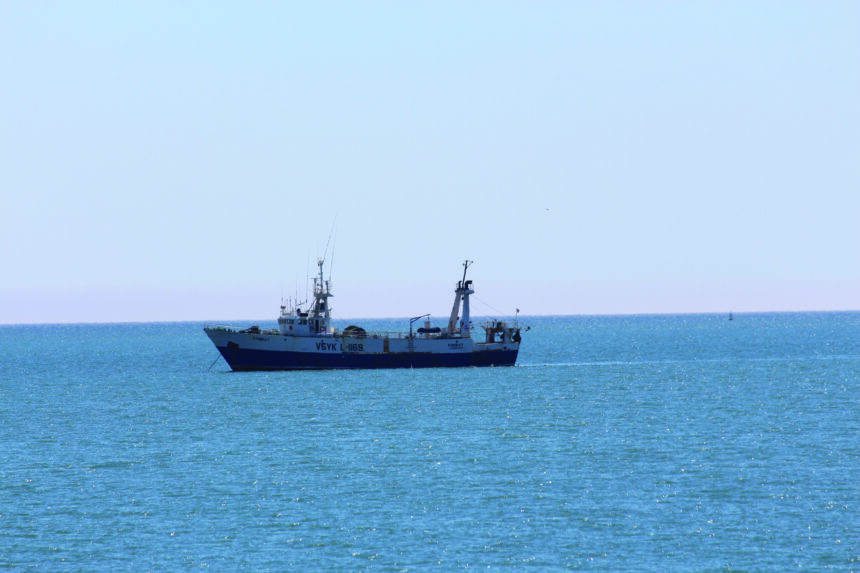. Oil, diamond mining activities fingered . Monitoring lasts 88 days
. Almost N$1 million per patrol . Ministry needs to double staff
Namibia’s fishing industry, a key contributor to the country’s economy, is confronted by a myriad of existential threats.
Primarily, the sector is under severe threat from illegal, unreported and unregulated (IUU) fishing, staff shortages and outdated equipment.
The troubles are etched in a recent report by the National Council’s standing committee on Agriculture, Environment and Natural Resources.
The dossier tabled in parliament follows an oversight visit to Walvis Bay and Lüderitz, which exposed critical challenges that threaten the country’s ability to protect and sustainably manage its marine resources.
In the 2022/2023 and 2023/2024 financial years, the sector contributed 4.2% and 4.6%, respectively, to Namibia’s Gross Domestic Product (GDP), making it the country’s second-largest foreign currency-earner after mining.
Illegal fishing
Illegal, unreported and unregulated fishing globally is notorious for threatening global marine resources, undermining efforts to sustainably manage fisheries and protect biodiversity.
The report states that this practice thrives in regions with compromised governance and weak management systems, where limited capacity and resources hinder effective monitoring, control and surveillance (MCS).
In this case, the resource-intensive nature of MCS has left many countries, including Namibia, struggling to safeguard their aquatic resources responsibly.
For the past years, IUU fishing has proven to be a headache to the sector.
“IUU fishing threatens livelihoods, exacerbates poverty, destabilises the industry, and should not be taken lightly,” the committee warns, adding that the illicit removal of fisheries’ resources could collapse the sector, if not adequately addressed.
To curb these activities, Namibia implemented a Vessel Monitoring System (VMS) in 2005.
Initially, licenced vessels had to report their location every four hours, but this frequency was reduced to one-hour intervals in 2022 to improve monitoring.
Although the VMS enables the ministry to detect vessels crossing restricted areas, foreign vessels not equipped with Automatic Identification Systems (AIS) remain difficult to track, allowing some illegal fishers to evade detection, the report indicates.
Confederation
Last year, the Confederation of Namibian Fishing Associations (CNFA) said the country loses over N$1.5 billion due to IUU fishing activities per year.
The CNFA observed that over 100 000 metric tonnes of fish are harvested by six or seven foreign trawlers which are allegedly working under licence in Angolan waters in the northern parts of the country annually.
The same year, the authorities impounded the Angolan-flagged MFV Lucimar vessel for alleged illegal fishing, where the captain and his 19 crew members were apprehended for being found fishing illegally, approximately 24 kilometres inside Namibian territorial waters near the Angolan Namibian border.
Midway through this year, the fisheries ministry said for the 2023/2024 financial year, a total of 13 cases have been reported, of which some involved foreign vessels.
In an interview with this publication, the Ministry of Fisheries and Marine Resources (MFMR)’s spokesperson Uaripi Katjuka said they are content with the implementation of their responsibility to ensure compliance with fisheries laws through its programmes on surveillance, inspections, detentions and investigations.
“The tasks of prosecution and conviction are assigned to other state offices. Therefore, it is inappropriate without a comprehensive assessment to determine other agencies’ performance,” she noted.
Staff shortages
Among an avalanche of issues the sector is facing, the report points to insufficient human resources as another chief challenge for the ministry.
There are only 174 fisheries inspectors and navigation officers spread across various towns, including Walvis Bay and Lüderitz.
Of these, only 123 are sea-going staff, insufficient to meet the demands of monitoring, control and surveillance across Namibia’s vast marine territory.
The ministry has in the past estimated that it needed to double its staff complement, yet many existing positions remain frozen. High staff turnover likewise continues to deplete the ministry of experienced personnel.
Beyond staffing, outdated equipment poses another critical problem.
“The MFMR relies on ageing patrol vessels and only one functional aircraft for sea patrols, as the other aircraft requires a N$23 million maritime radar replacement. Additionally, many of the patrol vehicles are outdated and non-functional, with some unable to pursue suspected perpetrators effectively,” states the report.
During the oversight, all patrol vehicles of the MFMR at Walvis Bay were reportedly found non-operational, resulting in diminished visibility of fishing inspectors, especially in inland waterways.
The report also shows that financial constraints are another critical barrier to effective marine resources’ protection.
Each patrol costs between N$500 000 and N$800 000, primarily for fuel and staff subsistence, making it challenging to maintain regular surveillance.
The report recommends that other ministries, including the ministry of defence and agencies such as the Namibian Police Force, contribute more resources, as MFMR alone cannot shoulder the financial burden.
Currently, Namibia’s patrol vessels only spend about 88 days at sea annually, far below the 144 days required for optimal monitoring.
Mining, exploration
The report also raises concerns about the environmental impact of oil and diamond mining activities on marine biodiversity.
The marine biologists at the MFMR office in Lüderitz informed the committee that high-impact seismic equipment used in resources exploration disrupts the communication of marine animals like whales and dolphins, often leading to beaching incidents.
They thus urged the government to establish stringent regulations to mitigate the impact of mining on marine ecosystems.
“Living resources are renewable and, if managed properly, could sustain the economy for generations,” the report stresses, urging caution in expanding marine mining activities.
Regional cooperation
Namibia is part of the Benguela current convention, a cooperative body with Angola and South Africa aimed at sustainable ocean governance.
However, the report notes inconsistencies in fishing practices across borders.
For instance, Namibia’s moratorium on pilchard fishing is not mirrored by neighbouring countries, leading to stock depletion.
The committee now urges the harmonisation of closed-season policies to allow fish populations to recover, emphasising that “fish know no boundaries.”


